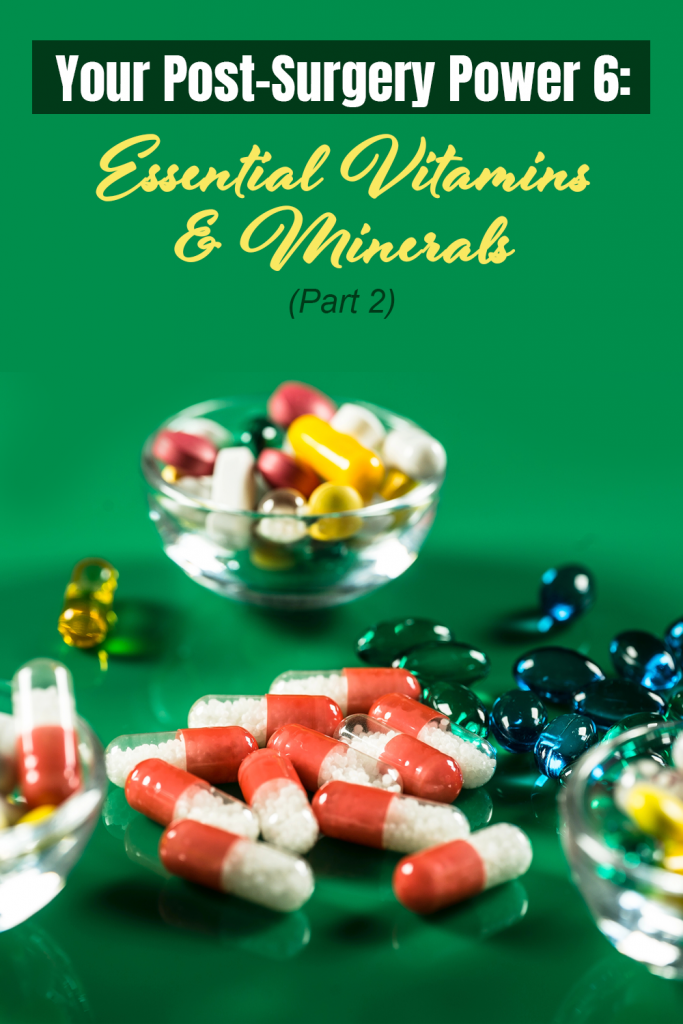
Your Post-Surgery Power 6: Essential Vitamins & Minerals (Part 2)
October 8, 2025If you’ve ever felt like you should own stock in bariatric supplements, you’re not alone. After surgery, supplements become part of your daily routine, and they’re here to stay. But let’s be honest: it gets confusing fast.
Which essential vitamins and minerals are truly essential for your health? Is your multivitamin enough, or do you also need extra vitamin D? What about iron, calcium, or B vitamins like thiamine?
Essential Vitamins & Minerals
Here’s the bottom line: the right nutrients in the right amounts can make a real difference in how you feel every single day. As Isabel Maples, a registered dietitian and Bariatric Coordinator at UVA Health in Haymarket, Virginia, puts it, “The most important vitamin or mineral is the one you don’t get enough of, don’t absorb well, or that causes the most harm if levels drop too low.”
Let’s get clear on what your body needs. This is part 2 of Your Post-Surgery Power 6: Essential Vitamins & Minerals. In part one, we covered a quality multivitamin and vitamin B12. Today we’ll tackle iron, calcium, vitamin D, and thiamine (vitamin B1). Keep in mind that your individual needs may vary based on labs, type of surgery, age, gender, and other health conditions. Work with your bariatric dietitian to tailor your supplement plan.
Iron: For Energy, Hair and More
Iron helps carry oxygen in your blood, so when it’s low, you feel it. Fatigue, pale skin, brittle nails, cold hands and feet, hair thinning, and shortness of breath can all signal iron deficiency. A low iron level can worsen heart and lung issues if left unchecked. Depending on the iron content of your multivitamin, you may or may not need an extra supplement. Many multis contain anywhere from 18 mg to 60 mg of iron. Whether that’s enough depends on your lab values, menstrual cycle, whether you’re trying to conceive, and whether you’re anemic (male or female). Routine bloodwork helps catch deficiencies early.
Constipation clue: Many iron supplements cause constipation. Slow-release forms or “gentle” iron (like iron bisglycinate) may help. Staying hydrated and eating fiber-rich foods (think beans, berries, flaxseed, and cooked veggies) is critical. So to avoid that miserable “concrete block” effect, keep your fiber and fluids up.
Pro Tip: Pair an iron-rich food such as black beans with a vitamin C-rich food (like oranges, peppers, or strawberries) to boost absorption. But don’t take calcium at the same time, as it interferes with iron absorption. Separate the two by at least two hours. Calcium, dairy, coffee, and tea can all block absorption. Wait at least two hours before or after.
Calcium: Protect Your Bones and Don’t Waste Your Dose
Calcium citrate is your best bet, as it’s better absorbed, especially if your stomach acid levels are low post-surgery. You may need 1,200–1,500 mg per day, split into divided doses of 500–600 mg at a time. Why? Because that’s the maximum your body can absorb in one sitting.
Important to remember: Calcium and iron don’t play nice together. Keep them at least two hours apart.
Often calcium is packaged with vitamin D, which helps your body absorb calcium from the gut. That brings me to…
Vitamin D: Check Your Form and Dosage
Aim for at least 2,000–3,000 IU (that’s 50–75 mcg) of vitamin D3 daily. Your needs may go higher depending on your lab results, so don’t skip your blood work.
Double-check that your supplement uses D3 (not D2), and look at the Supplement Facts label to confirm how much is included. If you’re taking it as part of your calcium supplement or multi, make sure the combined dose adds up to what you need.
Thiamine (Vitamin B1): A Small Dose That Prevents Big Problems
Thiamine should be in your multi at a dose of at least 12 mg per day. Deficiencies can happen quickly with rapid weight loss, vomiting, or poor intake, and they can lead to serious illness. If thiamine levels fall too low, your provider may treat you with higher doses than what’s found in a standard supplement. Early screening and quick action matter.
Real-world clue: Thiamine is water-soluble, which means that your body doesn’t store it. Missing it for just a few weeks could lead to deficiency.
Choose Wisely, Ask Questions, and Stick With It
Not all supplements are created equal. Read labels carefully. Check the form and dosage of each nutrient. And when in doubt? Ask your bariatric dietitian. We’re here to make sure you thrive, not just survive. Many companies offer samples to try before you buy.
And above all, take your supplements consistently. Timing, pairing, and frequency matter just as much as what you take. Done right, supplementation can help you feel your best, maintain your energy, and avoid preventable health issues after surgery.
Supplements aren’t just a to-do list item. They’re an investment in your health and long-term success. Get them right, and they’ll pay off every day.
Bariatric dietitian Dr. Susan Mitchell is host of the podcast Bariatric Surgery Success.

 | ABOUT THE AUTHOR Bariatric dietitian Dr. Susan Mitchell is host of the podcast Bariatric Surgery Success. Selected as one of the Best 35 Dietitian Podcasts, Bariatric Surgery Success was chosen from thousands of podcasts on the web ranked by traffic, social media followers, domain authority, and freshness. With a focus on nutrition before and after bariatric surgery, I help you eat for success while you conquer cravings, emotional eating, and weight regain. Read more articles by Susan! |



